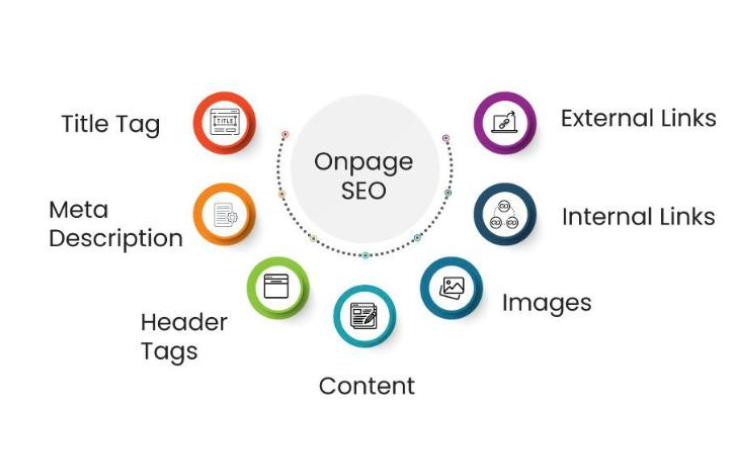On-page SEO involves optimizing individual web pages to improve search engine rankings and attract more relevant traffic. Unlike off-page SEO, which focuses on external signals like backlinks, on-page SEO centers on elements within your control on the website. effective on-page SEO can enhance visibility, lead to higher search engine rankings, and increase the overall user experience.
Why On-Page SEO Matters for Google Rankings
Search engines like Google use algorithms to rank websites. On-page SEO helps search engines understand what your page is about and whether it provides valuable content for users. Google prioritizes well-optimized content, making on-page SEO essential for any website aiming to rank higher.
Key Elements of On-Page SEO

1. Title Tags and Meta Descriptions
The title tag is the first thing users see in search results, making it a critical factor for on-page SEO. An engaging, keyword-rich title can improve click-through rates. Similarly, meta descriptions provide a brief overview of your page’s content. A well-crafted meta description can boost your visibility and attract more visitors.
2. High-Quality Content
Content is the backbone of on-page SEO. Focus on providing high-quality, informative, and unique content that addresses user queries. Google favors content that meets user intent, includes keywords naturally, and provides clear value.
3. Header Tags (H1, H2, H3, etc.)
Header tags help structure your content, making it easier for both users and search engines to understand. Use H1 for your main title, H2 for subheadings, and H3 for additional sections. Properly using header tags enhances content readability and boosts SEO.
4. Keyword Optimization
Incorporate relevant keywords strategically throughout your content. Use primary keywords in the title, meta description, headers, and body content. Avoid keyword stuffing, as it can lead to penalties. Instead, focus on maintaining a natural flow while covering relevant terms.
5. URL Structure
A clean and descriptive URL helps search engines and users understand the page’s content. Include the primary keyword in the URL and keep it concise. Avoid long, complex URLs with unnecessary numbers or characters.
6. Internal Linking
Internal linking refers to linking to other pages on your website. It improves navigation, keeps users engaged longer, and helps distribute link equity. Use descriptive anchor text that provides context about the linked page.
7. Image Optimization
Images play a crucial role in user engagement. Optimize images by using descriptive file names, adding alt text, and compressing them to reduce load times. Proper image optimization can enhance user experience and improve page rankings.
8. Page Load Speed
Page load speed is a critical ranking factor for Google. A fast-loading website improves user experience and reduces bounce rates. Optimize your page speed by compressing images, leveraging browser caching, and minimizing JavaScript and CSS.
See Also: Technical SEO Tips to Boost Your Website Performance
The Impact of On-Page SEO on User Experience
On-page SEO is not just about search engines; it also influences user experience. A well-optimized page with clear structure, high-quality content, and fast loading times provides a better experience for users. This can lead to higher engagement, longer visit durations, and more conversions.
Best Practices for On-Page SEO
1. Conduct Regular SEO Audits
Perform regular SEO audits to identify and address potential issues. Use tools like Google Search Console and other SEO platforms to analyze your website’s performance and make necessary adjustments.
2. Use Analytics to Track Performance
Use analytics tools to track how your on-page SEO efforts are impacting your website’s performance. Monitor changes in traffic, bounce rates, and rankings to understand what’s working and what needs improvement.
3. Update Content Regularly
Google values fresh and up-to-date content. Regularly update your website’s content to keep it relevant. This may include adding new information, refreshing old data, or optimizing for new keywords.
Call us: Contact us For SEO Services: +971 58 830 3415
Conclusion: The Role of On-Page SEO in Long-Term Success
On-page SEO is a crucial component of a successful SEO strategy. It not only helps you rank higher on Google but also improves user experience and increases engagement. Investing time in on-page optimization is an effective way to boost your website’s visibility and attract more targeted traffic, leading to long-term success.
